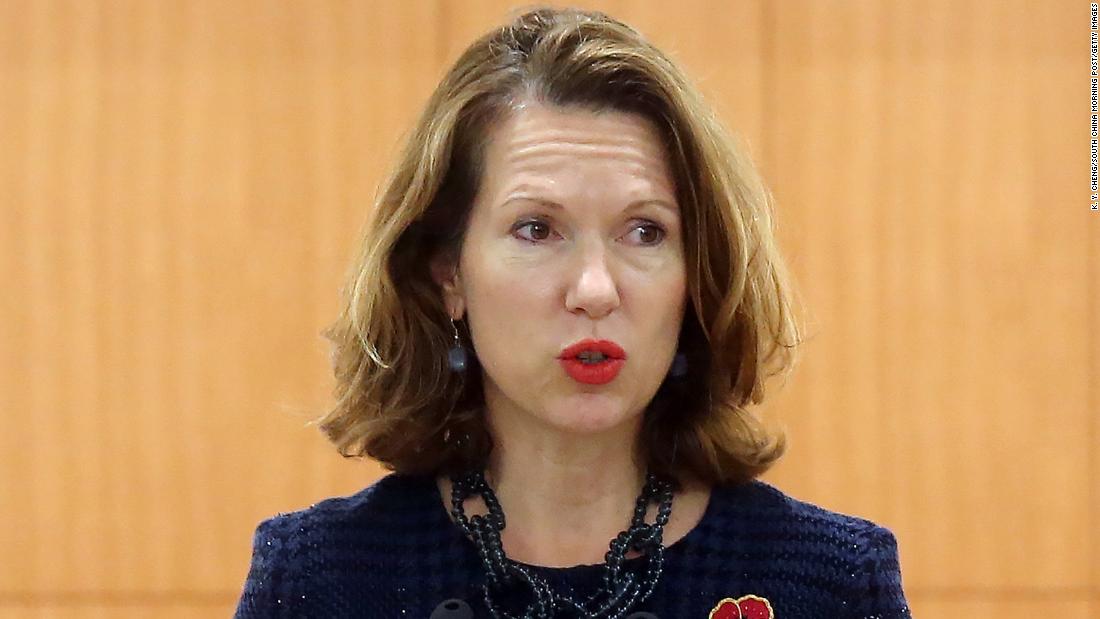The Chinese Foreign Ministry on Tuesday spoke with Ambassador Caroline Wilson and lodged a formal complaint with her against a report she published last week on WeChat, the popular Chinese social media network.
In the piece, Wilson argues that “foreign media in China are misrepresented, obscuring their positive role.”
“Criticism of foreign media about the Chinese authorities does not mean that they do not like China,” she wrote. “On the contrary, I believe they are acting in good faith and playing an active role as watchdogs for government action, to ensure that people have access to accurate information and to protect those who do not have a voice.”
Last month, British regulator Ofcom fired state broadcaster China Global Television Network, or CGTN, from British airwaves, saying the channel’s licensee had no ‘editorial responsibility’ for its production. Officials also said that CGTN could not transfer its license to a new entity because it would eventually still be controlled by the Chinese Communist Party.
One week later, the Chinese Radio and Television Administration (NRTA) banned the BBC World News and claimed that the network had broadcast reports about China that ‘infringed on the principles of truth and impartiality in journalism’.
In her WeChat post, WIlson added that local news organizations in China often face more difficult conditions than foreign ones.
“Unlike foreign media, Chinese media can only report critically under the conditions allowed by the government,” she wrote.
The article angered Chinese officials, calling Wilson’s post “inappropriate.”
In a statement on Tuesday, the head of the European Department’s Department of Foreign Affairs said that Wilson ‘complained [on behalf of] individual foreign media approved for fake news and inaccurate reports, who deliberately confused the slander of news and the monitoring of news and were ‘selectively blind’ to the foreign party’s attack on Chinese media. ‘
The Chinese official stressed during their meeting that the Chinese government and people never oppose foreign media, but those who deliver false news and brutally attack China, the Chinese Communist Party and the Chinese system under the banner of ‘press freedom’ and “freedom of expression”, according to the statement from the Chinese Foreign Ministry.
The ministry said Wilson’s article “has spread widespread discontent among the Chinese public and has been widely criticized”. It has since been restricted from being shared further on WeChat.
Tencent (TCEHY), the Chinese technology giant that manages the messaging platform, added a notice to the post saying it “violates” the rules of the platform. The company did not immediately respond to a request for comment Wednesday.
Wilson doubled her post Tuesday.
“I stand by my article,” she said
on Twitter.
The US social networking service has been blocked in China.
“The outgoing Chinese ambassador to the UK undoubtedly stands by the 170+ pieces he was able to freely place in the mainstream British media,” Wilson added, referring to Liu Xiaoming, China’s longtime envoy to Britain.
“The United Kingdom is committed to media freedom and to the pursuit of democracy and human rights around the world. We will always defend media freedom and the right of journalists to do their job,” said a spokesman for the UK’s Foreign Office. and Development said. a statement. The British embassy in Beijing declined to comment beyond Wilson’s remarks.
Chinese Foreign Ministry spokesman Zhao Lijian on Wednesday called for an intervention in China’s domestic affairs. [which] reflects her consistent double standards and deep-rooted ideological prejudice. ‘
Simmer tension
Chinese authorities have regularly criticized the portrayal of the country in Western media, but the focus on the BBC has been particularly sharp in recent months. Beijing has repeatedly expressed its frustration over reports of China’s repression of Uyghur and other ethnic Muslim minorities in Xinjiang.
Before CGTN was banned in the UK, Chinese state media unleashed numerous attacks on the BBC for what it called ‘malicious’ coverage of the human rights issue in Xinjiang. The BBC defended its reporting.
A few weeks after the UK revoked CGTN’s broadcasting license, CGTN posted a video entitled: “Why is BBC making fake news against China?” referring to the British network’s coverage of Hong Kong and Xinjiang.
Ofcom also beat CGTN on Monday with a £ 125,000 ($ 173,000) fine over several programs it aired in 2019 over the Hong Kong protests. The agency had earlier ruled that CGTN had repeatedly violated impartiality standards in its coverage of the demonstrations.
The agency also announced a fine of £ 100,000 ($ 139,000) for broadcasting the confession of a British citizen who was arrested in China in 2013. The man, Peter Humphrey, said his confession was forced.
